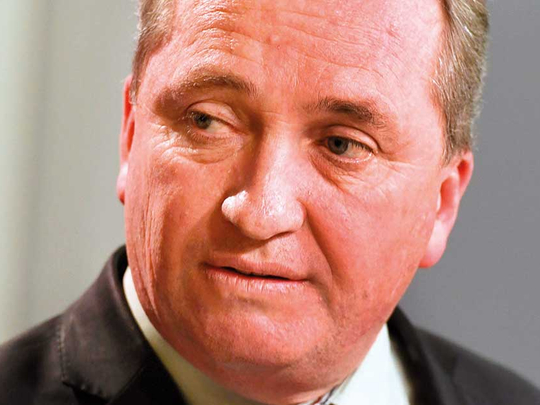
Canberra The Turnbull government has asked the high court to hear the citizenship cases involving Barnaby Joyce and Matt Canavan in the middle of September because there is “compelling public interest” in achieving a swift resolution.
The submission to the high court by the attorney general, made public on Tuesday, requests that the cases involving Joyce, Canavan, the two Green senators — Scott Ludlam and Larissa Waters — and the One Nation senator Malcolm Roberts be heard on 13 and 14 September.
The submission makes it clear the government does not dispute that Joyce is a citizen of New Zealand and Canavan is a citizen of Italy.
The attorney general’s submission says a quick outcome to the controversy is required “given that they involve the qualifications of several sitting senators and a member of the House of Representatives, and that the judgement of the court may have direct implications for the qualifications of two more senators [Fiona Nash and Nick Xenophon] who have confirmed that they are dual citizens, and with respect to whom questions regarding qualification are likely to be referred by the Senate to the court of disputed returns when parliament next sits”.
It is unclear when the cases involving Xenophon and the Nationals deputy leader Fiona Nash will be heard, given they have not yet been referred by the Senate to the high court.
A directions hearing will be held on Thursday to consider the timetable for hearings.
The submission confirms the government has already obtained legal opinions from “leading lawyers” in Italy on the Canavan matter, and New Zealand in relation to Joyce.
The expert advice confirms the two Nationals are citizens of Italy and New Zealand for the purposes of domestic law in each country.
The submission says the government’s understanding is those basic facts will not be disputed, and consequently “provide a sufficient account of the applicable foreign law to provide the foundation upon which the court can determine those references”.
It says if the court is satisfied with the process of asserting facts through the provision of expert legal advice the attorney general “proposes to obtain further legal opinions concerning the position of the other persons who have been referred to the court, and to place those opinions before the court on the same basis”.
The submission nominates specific legal experts in the UK, New Zealand and Canada who would be able to provide advice in relation to Roberts, Ludlam and Waters.
It says in the event that any person who is the subject of a reference to the high court “disputes the conclusion reached in any of the expert opinions anticipated” then their matter can be heard separately in order to expedite the process.
The submission also makes clear the commonwealth will pick up the legal costs of all the affected parties.
The court’s deliberations come as the major parties are continuing to trade blows over the citizenship fiasco.
Despite facing calls from government MPs for transparency, the Labor leader, Bill Shorten, has refused to provide documentation confirming he is not a UK citizen. On Tuesday, Shorten challenged the government to “put up or shut up”.
“I’ve renounced my citizenship, I did what I was supposed to do, but now they’re saying with no evidence at all: ‘Oh, there’s a cloud over Mr Shorten,’” the Labor leader said in Mackay.
“Well, let’s been straight here. I’m not going to go down the American crazy conspiracy path where you reverse the onus of proof, and by that I mean, you make an allegation with no evidence about your political rival, and then you start demanding the rival, the political opponent, has to jump through all sorts of hoops when in fact there’s no evidence to back up the allegation whatsoever.
“I say to Mr Turnbull, if you have evidence that I’m still a British citizen, put up or shut up. And in the meantime, if you haven’t got the evidence, stop wasting the time of the nation and get back to your day job.”












